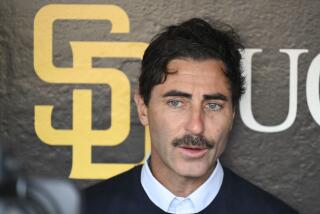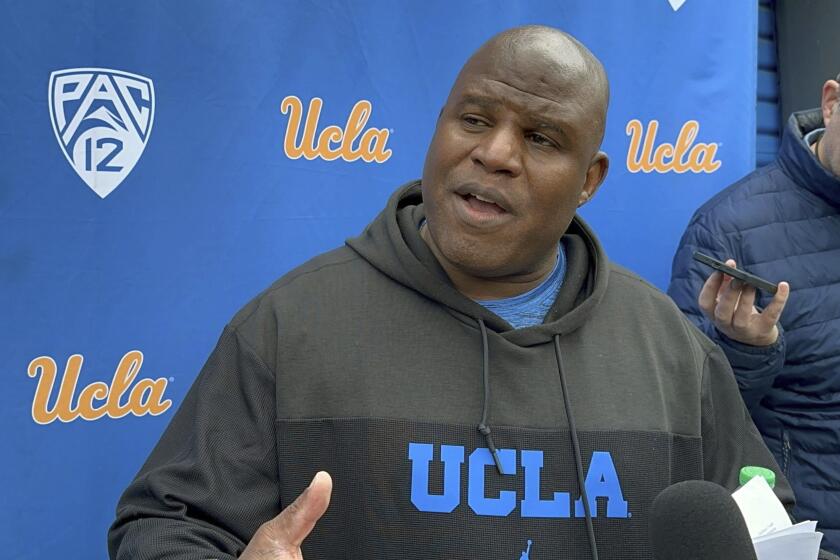Game May Be Over for Chess King Fischer
For 12 years he has stayed one move ahead of the U.S. government he despises, always in motion, hard to corner. But American justice may have finally caught up with Bobby Fischer.
Wanted for defying an American ban on doing business with Yugoslavia in 1992, the onetime world chess champion was arrested by Japanese immigration officials this week as he tried to fly out of Tokyo’s Narita airport. Fischer, who was headed to the Philippines, stands accused by the Japanese of traveling on a revoked American passport.
The man often said to possess the world’s most brilliant chess mind -- and a great eccentric in a profession bulging with them -- now sits in an airport jail facing deportation and subsequent arrest by U.S. marshals as early as Sunday.
Returning to the U.S. in handcuffs would mark a bitter homecoming for the Brooklyn-raised exile. In the 1960s and ‘70s, Fischer transformed chess from nerdy to sexy and became a Cold War-era hero by vanquishing Boris Spassky, the Soviet Union’s best, in the legendary 1972 world championship contest.
He has been a recluse almost ever since. Now 61, Fischer has emerged in public only fitfully in recent years, usually to berate the U.S. government for what he regards as its evil foreign policies and to cast himself as the victim of persecution by “world Jewry.”
A return to face trial on the 1992 charge -- which could carry a prison sentence of up to 10 years and a $50,000 fine -- now looks increasingly likely.
Fischer has yet to hire a lawyer to fight deportation proceedings stemming from the Japanese government’s contention that he entered the country with an illegal passport, said Miyoko Watai, a friend who heads the Japanese Chess Assn.
Watai, who said she had known Fischer since 1973, said he phoned her after being taken into custody, and “the problem is he doesn’t trust the lawyers.”
Instead, Fischer has declared himself a political prisoner, appealing via a Japan-based Internet site for asylum in a “friendly third country.” Through Watai, he claimed to have been “viciously attacked, brutalized, seriously injured and very nearly killed” during his airport arrest.
Japanese officials acting “in collusion with the U.S. government” destroyed his passport, he said.
The U.S. case against him stems from his out-of-retirement exhibition battle with Spassky in 1992, which led to a $3.5-million payday for Fischer. Staged in Yugoslavia, a federation unraveling in civil war, his appearance violated United Nations sanctions and an embargo signed by the first President Bush barring Americans from doing business in the Balkan country.
But Fischer’s quarrel with Washington runs deeper than his refusal to abide by a presidential ban -- a stance he expressed at the time by publicly spitting on his copy of the Treasury Department letter forbidding him to play in Yugoslavia.
On his personal website and in radio interviews delivered from various points of exile, Fischer has become known as an intemperate critic of Washington, his philosophizing punctuated by ferocious anti-Jewish diatribes, despite the fact that his mother was Jewish.
His rages from the fringe culminated in an interview on Philippine radio on Sept. 11, 2001, in which he exulted in the terrorist attacks on New York and the Pentagon. He praised the horrific events as “wonderful news,” declaring that America got what it deserved for supporting Israel. “I want to see the U.S. wiped out,” he said.
Fischer has kept up the drumbeat since, and Watai believes that his verbal attacks have stirred up U.S. authorities. The chess master has been reclusive but hardly impossible to find in recent years. His peripatetic lifestyle -- shuttling between his base in Tokyo and outposts in, among other places, Hungary and the Philippines, where a daughter was reportedly born in 2000 -- implies that he frequently passes through immigration controls.
“They could have arrested him anytime, anytime since 1992,” Watai said. “Since 1992 he has traveled all over without trouble.” The difference now, she argued, is that “suddenly he starts to attack America. He made the American government very angry.”
Officials at the U.S. Embassy refused to discuss Fischer’s case Friday, citing privacy laws, although they confirmed that he was being detained by the Japanese. “We don’t prosecute people for their political views,” one U.S. official said privately.
Watai said the sequence of events concerning Fischer’s passport status raises questions about Washington’s interest in the former chess champion.
Fugitives may not be issued a new American passport unless it is used to enable them to return to face trial. Fischer, however, was issued a new passport in 1997 by the American Embassy in Bern, Switzerland -- more than four years after his arrest warrant was signed, Watai said.
That passport was revoked in a letter sent from the U.S. Embassy in Manila, dated Dec. 11, 2003, said Watai, who added that Fischer never received the notification. According to the document, which Watai posted online, the passport was rescinded on the order of the State Department in Washington.
A Japanese government document also posted by Watai indicated that Fischer’s passport was accepted as valid when he entered Japan on April 15 on a 90-day visa. That permission was rescinded retroactively only when he was stopped on his way out through Narita on Tuesday.
Fischer’s arrest comes as Tokyo and Washington appear to be nearing an agreement on how to deal with the expected arrival here of former U.S. Army Sgt. Charles Robert Jenkins, who allegedly defected to North Korea almost 40 years ago. Jenkins, who needs medical treatment, is married to a Japanese woman.
U.S. Ambassador Howard H. Baker Jr., who met with Foreign Minister Yoriko Kawaguchi today, said the U.S. might delay taking Jenkins into custody so he could be treated.
In Tokyo, Fischer was in the city he was most likely to call home at the time of his arrest. He has lived in this sprawling metropolis of 13 million intermittently for several years, blessedly anonymous in a culture in which the Western version of chess remains a specialized taste.
Fischer has occasionally dropped into some of Tokyo’s chess clubs, autographing a board for one group, according to a Japanese newspaper. He reportedly spends most of his time playing random chess, a game he invented in 1996. In it, back-row pieces are arranged in various orders to do away with what he calls the yawning predictability of classic chess.
But Fischer has his political quarrels with Japan too. “He doesn’t like the way the Japanese government follows American policy,” Watai said. “He thinks Japan is not independent. He thinks Japan is still an occupied country.
“But he doesn’t want to go back to America,” she continued. “He doesn’t like Americans or American food.”
And, she added emphatically, “he doesn’t like the American government. Not at all.”
More to Read
Go beyond the scoreboard
Get the latest on L.A.'s teams in the daily Sports Report newsletter.
You may occasionally receive promotional content from the Los Angeles Times.










